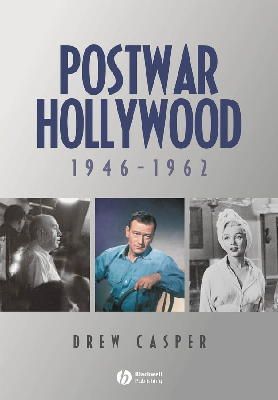
Stock image for illustration purposes only - book cover, edition or condition may vary.
Postwar Hollywood: 1946-1962
Drew Casper
€ 54.03
FREE Delivery in Ireland
Description for Postwar Hollywood: 1946-1962
Paperback. Post-War Hollywood Cinema is an accessible and comprehensive history of the American film industry, from 1946 to 1962. Drew Casper chronicles the restructuring of Hollywood cinema against the backdrop of the major political, economic, and social changes taking place after World War II. Num Pages: 484 pages, Illustrations. BIC Classification: 1KBB; 3JJPG; APF; HBTB. Category: (P) Professional & Vocational. Dimension: 247 x 173 x 28. Weight in Grams: 852.
Postwar Hollywood is a comprehensive history of the American film industry, from 1946-1962.
- A comprehensive introductory textbook exploring the unique period in the history of the film industry after World War II
- Examines the cultural history, business practices, new technologies, censorship standards, emerging genres, and styles of post-war cinema
- Chronicles the restructuring of Hollywood cinema against the backdrop of the major political, economic, and social changes taking place after World War II
- Features in-depth discussions of important films from Picnic, The Heiress, and From Here to Eternity, to Cat On A Hot Tin Roof and Love Me or Leave Me
- Illustrates the culture/filmmaking interface, ... Read more
Product Details
Publisher
John Wiley and Sons Ltd
Number of pages
484
Format
Paperback
Publication date
2007
Condition
New
Number of Pages
496
Place of Publication
Hoboken, United Kingdom
ISBN
9781405150750
SKU
V9781405150750
Shipping Time
Usually ships in 7 to 11 working days
Ref
99-1
About Drew Casper
Drew Casper is the Alma and Alfred Hitchcock Professor of American Film at the University of Southern California’s School of Cinematic Arts. His books include: Vincente Minnelli and the Film Musical, The Style of Stanley Donen, and An Introduction to Film Reader. He is a DVD commentator on innumerable American films of the classical and postwar periods.
Reviews for Postwar Hollywood: 1946-1962
“Drew Casper’s volume is a stunning achievement in American film history. Combining love for the films themselves and the creative talent behind them with a sharp attention to contexts – cultural, social, and industrial – Casper offers a comprehensive, sharply argued look at Hollywood cinema in a complex, even vexed, historical moment.” Dana Polan, New York University
